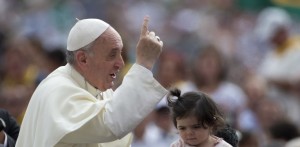As you know Pope Francis wrote a letter to an Italian journalist, Eugenio Scalfari, who claims to be an atheist; the letter was printed in the Italian daily, La Repubblica. To make a generalization, this newspaper is a left-leaning publication. This letter is now widely read by people across the globe because even the rabid anti-Christian people are interested in Pope Francis these days. AND this is a good thing. The money quote for me from the Pope’s letter to Doctor Scalfari is when the Pope said, “For me, faith began by meeting with Jesus.” The Pope does what we serious Christians ought to be doing, that is, engaging the non-believer, helping the believer who is wavering in faith and doing the hard word ourselves. There is no new doctrine here, there is no new advantage gained in printing this letter; there is, however, great charity and fraternal concern. There is no such thing as a part time Christian. We good witnesses more than teachers in the faith. Will the witnesses present themselves?
BTW, you may want to refresh your memory with Lumen gentium, 16.
The Pope’s letter follows.
Dear Doctor Scalfari,
 I would cordially like to reply to the letter you addressed to me from the pages of La Repubblica on July 7th, which included a series of personal reflections that then continued to enrich the pages of the daily newspaper on August 7th.
I would cordially like to reply to the letter you addressed to me from the pages of La Repubblica on July 7th, which included a series of personal reflections that then continued to enrich the pages of the daily newspaper on August 7th.
First of all, thank you for the attention with which you have read the Encyclical Lumen fidei.” In fact it was the intention of my beloved predecessor, Benedict XVI, who conceived it and mostly wrote it, and which, with gratitude, I have inherited, to not only confirm the faith in Jesus Christ, for those who already believe, but also to spark a sincere and rigorous dialogue with those who, like you, define themselves as “for many years being a non-believer who is interested and fascinated by the preaching of Jesus of Nazareth.”
Therefore, without a doubt it would seem to be positive, not only for each one of us, but also for the society in which we live, to stop and speak about a matter as important as faith and which refers to the teachings and the figure of Jesus.
In particular, I think there are two circumstances which today cause this dialogue to be precious and necessary. This is one of the principal aims of the Second Vatican Council, convened at the behest of John XXIII as well as by the Apostolic Ministry of the Popes who, each with their own sensibility and help have since then continued in the course traced by the Council.
The first circumstance -that refers to the initial pages of the Encyclical- derives from the fact that, down in the centuries of modern life, we have seen a paradox: Christian faith, whose novelty and importance in the life of mankind since the beginning has been expressed through the symbol of light, has often been branded as the darkness of superstition which is opposed to the light of reason. Therefore a lack of communication has arisen between the Church and the culture inspired by Christianity on one hand and the modern culture of Enlightenment on the other. The time has come and the Second Vatican has inaugurated the season, for an open dialogue without preconceptions that opens the door to a serious and fruitful meeting.
The second circumstance, for those who attempt to be faithful to the gift of following Jesus in the light of faith, derives from the fact that this dialogue is not a secondary accessory in the existence of those who believe, but is rather an intimate and indispensable expression. Speaking of which, allow me to quote a very important statement, in my opinion, of the Encyclical: as the truth witnessed by faith is found in love -it is stressed- “it seems clear that faith is not unyielding, but increases in the coexistence which respects the other. The believer is not arrogant; on the contrary, the truth makes him humble, in the knowledge that rather than making us rigid, it embraces us and possesses us. Rather than make us rigid, the security of faith makes it possible to speak with everyone” (n.34). This is the spirit of the words I am writing to you.
For me, faith began by meeting with Jesus. A personal meeting that touched my heart and gave a direction and a new meaning to my existence. At the same time, however, a meeting that was made possible by the community of faith in which I lived and thanks to which I found access to the intelligence of the Sacred Scriptures, to the new life that comes from Jesus like gushing water through the Sacraments, to fraternity with everyone and to the service to the poor, which is the real image of the Lord. Believe me, without the Church I would never have been able to meet Jesus, in spite of the knowledge that the immense gift of faith is kept in the fragile clay vases of our humanity.
Now, thanks to this personal experience of faith experienced in Church, I feel comfortable in listening to your questions and together with you, will try to find a way to perhaps walk along a path together.
Please forgive me if I do not follow the arguments proposed by you step by step in your editorial of July 7th. It would seem more fruitful to me -or more congenial- to go right to the heart of your considerations. I will not even go into the manners of explanation followed by the Encyclical, in which you find the lack of a section specifically dedicated to the historical experience of Jesus of Nazareth.
To start, I will only observe that such an analysis is not secondary. In fact, following the logic of the Encyclical, this means paying attention to the meaning of what Jesus said and did and after all, of what Jesus has been and is for us. The Letters of Paul and the Gospel according to John, to which particular reference is made in the Encyclical, are in fact created on the solid foundation of the Messianic Ministry of Jesus of Nazareth which culminated in the pentecost of death and resurrection.
Therefore, I would say that we must face Jesus in the concrete roughness of his story, as above all told to us by the most ancient of the Gospels, the one according to Mark. We then find that the “scandal” which the word and practices of Jesus provoke around him derive from his extraordinary “authority”: a word that has been certified since the Gospel according to Mark, but that is not easy to translate well into Italian. The Greek word is “exousia,” which literally means “comes from being” what one is. It is not something exterior or forced, but rather something that emanates from the inside and imposes itself. Actually Jesus, amazes and innovates starting from, he himself says this, his relationship with God, called familiarly Abbà, who gives him this “authority” so that he uses it in favor of men.
So Jesus preaches “like someone who has authority,” he heals, calls his disciples to follow him, forgives… things that, in the Old Testament, belong to God and only God. The question that most frequently is repeated in the Gospel according to Mark: “Who is he who…?”, and which regards the identity of Jesus, arises from the recognition of an authority that differs from that of the world, an authority that aims not at exercising power over others, but rather serving them, giving them freedom and the fullness of life. And this is done to the point of staking his own life, up to experiencing misunderstanding, betrayal, refusal, until he is condemned to die, left abandoned on the cross. But Jesus remained faithful to God, up to his death.
And it is then -as the Roman centurion exclaims, in the Gospel according to Mark- that Jesus is paradoxically revealed as the Son of God. Son of a God that is love and that wants, with all of himself that man, every man, discovers himself and also lives like his real son. For Christian faith this is certified by the fact that Jesus rose from the dead: not to be triumphant over those who refused him, but to certify that the love of God is stronger than death, the forgiveness of God is stronger than any sin and that it is worthwhile to give one’s life, to the end, to witness this great gift.
Christian faith believes in this: that Jesus is the Son of God who came to give his life to open the way to love for everyone. Therefore there is a reason, dear Dr. Scalfari, when you see the incarnation of the Son of God as the pivot of Christian faith. Tertullian wrote “caro cardo salutis,” the flesh (of Christ) is the pivot of salvation. Because the incarnation, that is the fact that the Son of God has come into our flesh and has shared joy and pain, victories and defeat of our existence, up to the cry of the cross, living each event with love and in the faith of Abbà, shows the incredible love that God has for every man, the priceless value that he acknowledges. For this reason, each of us is called to accept the view and the choice of love made by Jesus, become a part of his way of being, thinking and acting. This is faith, with all the expressions that have been dutifully described in the Encyclical [Lumen fidei].
* * *
In your editorial of July 7th, you also asked me how to understand the originality of Christian Faith as it is actually based on the incarnation of the Son of God, with respect to other religions that instead pivot on the absolute transcendency of God.
I would say that the originality lies in the fact that faith allows us to participate, in Jesus, in the relationship that He has with God who is Abbà and, because of this, in the relationship that He has with all other men, including enemies, in the sign of love. In other words, the children of Jesus, as Christian faith presents us, are not revealed to mark an insuperable separation between Jesus and all the others: but to tell us that, in Him, we are all called to be the children of the only Father and brothers with each other. The uniqueness of Jesus is for communication not for exclusion.
Of course a consequence of this is also – and this is not a minor thing- that distinction between the religious sphere which is confirmed by “Give to God what belongs to God and give to Caesar what belongs to Caesar,” distinctly confirmed by Jesus and upon which, the history of the Western world was built. In fact, the Church is called to sow the yeast and salt of the Gospel, and that is the love and mercy of God which reaches all men, indicating the definitive destination of our destiny in the hereafter, while civil and political society has the difficult duty of expressing and embodying a life that is evermore human in justice, in solidarity, in law and in peace. For those who experience the Christian faith, this does not mean escaping from the world or looking for any kind of supremacy, but being at the service of mankind, of all mankind and all men, starting from the periphery of history and keeping the sense of hope alive, striving for goodness in spite of everything and always looking beyond.
At the end of your first article, you also ask me what to say to our Jewish brothers about the promise God made to them: Has this been forgotten? And this -believe me- is a question that radically involves us as Christians because, with the help of God, starting from the Second Vatican Council, we have discovered that the Jewish people are still, for us, the holy root from which Jesus originated. I too, in the friendship I have cultivated in all of these long years with our Jewish brothers, in Argentina, many times while praying have asked God, especially when I remember the terrible experience of the Shoah. What I can say, with the Apostle Paul, is that God has never stopped believing in the alliance made with Israel and that, through the terrible trials of these past centuries, the Jews have kept their faith in God. And for this, we will never be grateful enough to them, as the Church, but also as humanity at large. Persevering in their faith in God and in the alliance, they remind everyone, even us as Christians that we are always awaiting, the return of the Lord and that therefore we must remain open to Him and never take refuge in what we have already achieved.
As for the three questions you asked me in the article of August 7th. It would seem to me that in the first two, what you are most interested in is understanding the Church’s attitude towards those who do not share faith in Jesus. First of all, you ask if the God of the Christians forgives those who do not believe and do not seek faith. Given that -and this is fundamental- God’s mercy has no limits if he who asks for mercy does so in contrition and with a sincere heart, the issue for those who do not believe in God is in obeying their own conscience. In fact, listening and obeying it, means deciding about what is perceived to be good or to be evil. The goodness or the wickedness of our behavior depends on this decision.
Second of all, you ask if the thought, according to which no absolute exists and therefore there is no absolute truth, but only a series of relative and subjective truths is a mistake or a sin. To start, I would not speak about, not even for those who believe, an “absolute” truth, in the sense that absolute is something detached, something lacking any relationship. Now, the truth is a relationship! This is so true that each of us sees the truth and expresses it, starting from oneself: from one’s history and culture, from the situation in which one lives, etc. This does not mean that the truth is variable and subjective. It means that it is given to us only as a way and a life. Was it not Jesus himself who said: “I am the way, the truth, the life”? In other words, the truth is one with love, it requires humbleness and the willingness to be sought, listened to and expressed. Therefore we must understand the terms well and perhaps, in order to avoid the over simplification of absolute contraposition, reformulate the question. I think that today this is absolutely necessary in order to have a serene and constructive dialogue which I hoped for from the beginning.
In the last question you ask if, with the disappearance of man on earth, the thoughts able to think about God will also disappear. Of course, the greatness of mankind lies in being able to think about God. That is in being able to experience a conscious and responsible relationship with Him. But the relationship lies between two realities. God – this is my thought and this is my experience, but how many, yesterday and today, share it! – is not an idea, even if very sublime, the result of the thoughts of mankind. God is a reality with a capital “R”. Jesus reveals this to us – and he experiences the relationship with Him – as a Father of infinite goodness and mercy. God therefore does not depend on our thoughts. On the other hand, even when the end of life for man on earth should come – and for Christian faith, in any case the world as we know it now is destined to end, man will not finish existing and, in a way that we do not know, nor will the universe created with him. The Scriptures speak of “new skies and a new land” and confirm that, in the end, at the time and place that it is beyond our knowledge, but which we patiently and desirously await, God will be “everything in everyone.”
Dear Dr. Scalfari, here I end these reflections of mine, prompted by what you wanted to tell and ask me. Please accept this as a tentative and temporary reply, but sincere and hopeful, together with the invitation that I made to walk a part of the path together. Believe me, in spite of its slowness, the infidelity, the mistakes and the sins that may have and may still be committed by those who compose the Church, it has no other sense and aim if not to live and witness Jesus: He has been sent by Abbà “to bring good news to the poor…to proclaim release to the captives and recovery of sight to the blind, to let the oppressed go free, to proclaim the year of the Lord’s favor” (Luke 4: 18-19).
With brotherly love,
Francesco
(Translated from Italian by Sara Cecere)

